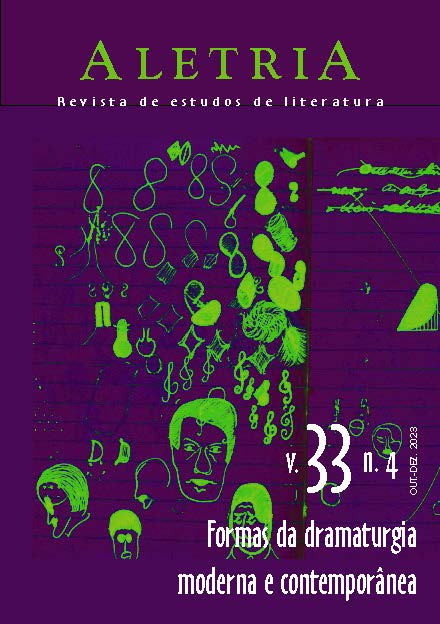The Mode of Enunciation in Beckett’s Plays
DOI :
https://doi.org/10.35699/2317-2096.2023.45547Mots-clés :
Becket ; langue; impasse; personnage; représentation; interprétation.Résumé
This article analyses the question of language and its predicament as it is worked out as something that permeates the construction of the characters in Samuel Beckett’s three main plays: Waiting for Godot, Happy Days and Endgame. It therefore resorts to the analysis of language as containing the approach of the Other that can be understood as the unconscious. Authors such as Theodor W. Adorno and Michael Worton are addressed as they examine the philosophical aspects of the plays and the intersections between nonverbal language and a silent reading of them. The dilemmas of the characters in the three plays, similar to those of modern and contemporary individuals, are analyzed in the context in which the Theatre of the Absurd is inserted. It concludes that Beckett’s use of language reflects new identities that are being formed as it questions reality in its engagement with discourse and the present.
Références
ADORNO, Theodor W. Trying to Understand Endgame. In: BIRKETT, Jennifer; INCE, Kate (ed.). Samuel Beckett. London: Routledge, 2001. p. 119-150.
ATKINSON, Brooks. Beckett’s ‘Endgame’. The New York Times, New York, 29 Jan. 1958. Available at: https://archive.nytimes.com/www.nytimes.com/books/97/08/03/reviews/beckett-endgame.html?_r=2. Accessed on: 14 Apr. 2021.
BECKETT, Samuel. The Complete Dramatic Works. London: Faber and Faber, 1990.
DAVIES, Paul. Samuel Beckett. The Literary Encyclopedia. First published 8 Jan. 2001. Available at: http://www.litencyc.com/php/speople.php?rec=true&UID=5161. Accessed on: 5 Oct. 2021.
DUKES, Gerry. Overlook Illustrated Lives: Samuel Beckett. Woodstock; New York: Overlook Press, 2004.
ESSLIN, Martin. The Theatre of the Absurd. New York: Anchor Books, 1961.
FOUCAULT, Michel. The Archeology of Knowledge and the Discourse on Language. New York: Pantheon Books, 1972.
FOUCAULT, Michel. The Order of Things. London: Routledge, 1994.
GREENBLATT, Stephen (ed.). Samuel Beckett. In: GREENBLATT, Stephen (ed.). The Norton Anthology of English Literature. New York: W. W. Norton & Company, 2006. p. 2661-2688.
PILLING, John. (ed.). The Cambridge Companion to Beckett. Cambridge: Cambridge University Press, 2010.
ROSENFIELD, Kathrin H. A linguagem liberada. São Paulo: Perspectiva, 1989.
SHAKESPEARE, William. Complete Works. Stanley Wells and Gary Taylor (ed.). Oxford: Oxford University Press, 2005.
WATT, Stephen. Beckett and Contemporary Irish Writing. Cambridge: Cambridge University Press, 2011.
WORTON, Michael. Waiting for Godot and Endgame: Theatre as Text. In: PILLING, John. (ed.). The Cambridge Companion to Beckett. Cambridge: Cambridge University Press, 2010. p. 67-87.
Téléchargements
Publiée
Numéro
Rubrique
Licence
(c) Copyright Rafael Campos Oliven (Autor) 2024

Ce travail est disponible sous la licence Creative Commons Attribution 4.0 International .
Authors who publish with this journal agree to the following terms:Authors retain copyright and grant the journal right of first publication with the work simultaneously licensed under a Creative Commons Attribution Non-Commercial No Derivatives License that allows others to share the work with an acknowledgement of the work's authorship and initial publication in this journal.Authors are able to enter into separate, additional contractual arrangements for the non-exclusive distribution of the journal's published version of the work (e.g., post it to an institutional repository or publish it in a book), with an acknowledgement of its initial publication in this journal.Authors are permitted and encouraged to post their work online (e.g., in institutional repositories or on their website) prior to and during the submission process, as it can lead to productive exchanges, as well as earlier and greater citation of published work (See The Effect of Open Access).





